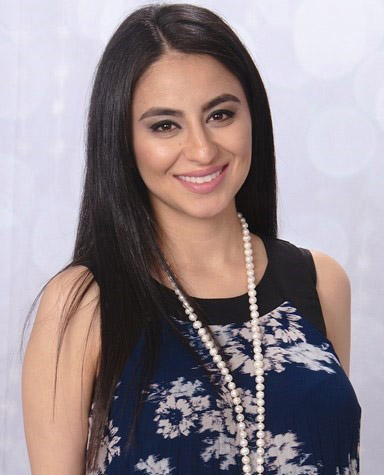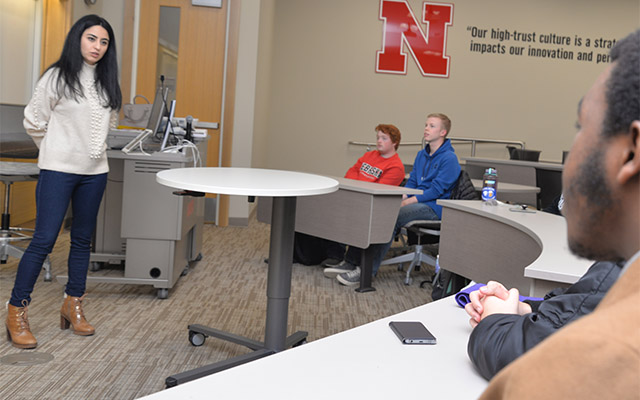Malika Pulatova, ’05, arrived at the University of Nebraska-Lincoln from Tajikistan in 2001 to study international business and begin a journey she hopes may one day create a positive impact in her homeland. She came to the United States speaking little English but discovered how she could make a worldwide impact through a job at the United Nations Capital Development Fund (UNCDF) office in New York City.
“I’ve been thinking about how I can help my home country ever since I landed in the U.S.,” Pulatova said. “My passion has always been to help women and children. Tajikistan has a high suicide rate for women. One of my best friends was one of the women who committed suicide. There are no shelters and domestic violence is on the rise, so one of my aspirations is to create safe havens for women and children.”
Pulatova set out to help others by first helping herself by taking an intensive English language class at Nebraska. She intuitively believed her international business career would require an interdisciplinary approach. Even though she already knew multiple languages, she decided to minor in Russian and Chinese.
“I grew up with a lot of insecurities and people not believing in me. I come from a culture, where as a woman, I felt discriminated against and put down. I was expected to get married early and have kids. Having career ambitions was not something I was taught,” she said.
 At the College of Business, Pulatova challenged herself with practical skills she still uses every day in her job at the United Nations.
At the College of Business, Pulatova challenged herself with practical skills she still uses every day in her job at the United Nations.
At Nebraska, she met professors who provided encouragement and one-on-one support that gave her a confidence she had yet to experience. As she worked through challenges, her abilities shined.
“Taking an interdisciplinary approach not only broadens your knowledge base but broadens the people in your network. You’re challenging yourself by meeting different types of people. I go to networking events a lot in New York, but the people I sat with in class are the best contacts and were the reference points for jobs that led me where I am today.”
Through her experience studying Russian, she got involved in the UCARE undergraduate research program. She interviewed people from the former Soviet Union as part of a project to better understand their assimilation. The project fit perfectly with her career objectives.
“Here I am coming from a country where I didn’t feel respected, and now I’m leading a research project and writing papers – this was a big deal for me. Dr. Mila Saskova-Pierce (emeritus associate professor of Russian) saw potential in me and gave me responsibilities where I used my language skills to become a researcher. I didn’t know I would be good at quantitative and qualitative analysis, but in that process, I learned more about myself and my confidence grew.”
At the College of Business, Pulatova challenged herself with practical skills she still uses every day. She believes one of her most important experiences at Nebraska happened during the senior-level management capstone course.
“The capstone course allowed me to work with a specific firm where we wrote a business proposal, produced an actual product and did it in a team setting. Working in teams is critical to get new perspectives, and the real-life scenario we worked on in class was helpful in my job interviews. Employers asked specific questions pertaining to what I had accomplished in class.”
Pulatova lauded the efforts of Dr. Sang Lee, professor emeritus of management, as a significant motivator her senior year. Lee helped pave the way for the growth of international business and entrepreneurial studies at Nebraska. He worked closely with many students from the former Soviet Union countries in Central Asia, including Pulatova.
“Those students did not have the background of being taught entrepreneurship, critical thinking and taking risk,” said Lee. “That was a big eye opener for them. My approach was to teach them entrepreneurship, modern management techniques and emphasize the market economy. To see a student like Malika working at the United Nations is an incredible accomplishment.”
Pulatova learned additional research and presentation skills in her management classes. She uses them today handling the procurement process for significant projects, such as microfinance loans which facilitate development in countries throughout Africa, Asia and elsewhere.
“I help manage the bidding system and proposal reviews at the UNCDF. It’s a lot of paperwork but I also travel and get to oversee the field work and operations in person. It’s hard to predict what’s going to happen every day but we have to make sure the staff are paid, they have insurance and all the travel is arranged,” said Pulatova.
 Pulatova talked to multiple classes at the College of Business to give students insights on what it takes to work in a global institution like the United Nations.
Pulatova talked to multiple classes at the College of Business to give students insights on what it takes to work in a global institution like the United Nations.
Dr. Kalu Osiri, director of the international business program and associate professor of practice in management at Nebraska Business, invited Pulatova into classrooms at Howard L. Hawks Hall last fall. He wanted her to tell current students what they could accomplish by following her lead.
“Working for prestigious multinational organizations, such as the United Nations, can seem unattainable for students,” said Osiri. “Malika not only inspired our business students to aspire to work in humanitarian organizations, she also demystified the employment process. For example, she encouraged students to begin by volunteering in similar local nonprofit and non-governmental outfits like the Red Cross and to pick up new languages. The future of education is experiential learning that features interdisciplinary projects and case studies set in the global context – she is a perfect example for all that.”
Pulatova hopes her efforts can one day lead her back to Tajikistan to provide relief in the face of poverty and broken families.
“I want to create economic opportunities for women. We need to organize and educate women so suicide is not the only way, as it breaks my heart to know the orphanages are full. We sometimes get so busy with life we forget about the thing we are meant to do. I want to take the skills I learned at Nebraska to help create shelters for women so they have a place to go with their children.”
Published: March 12, 2019